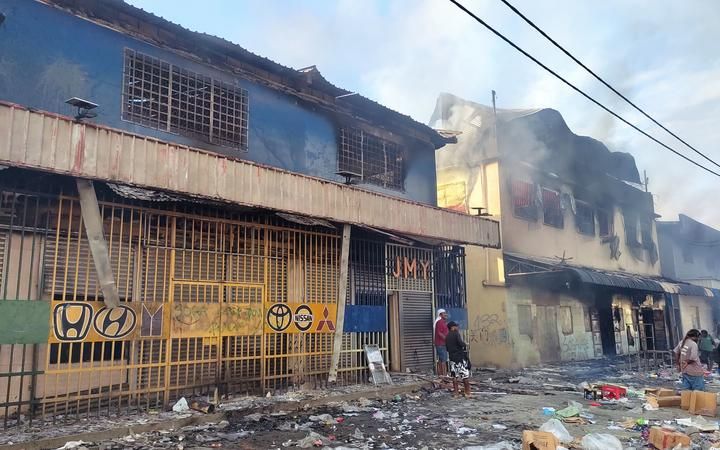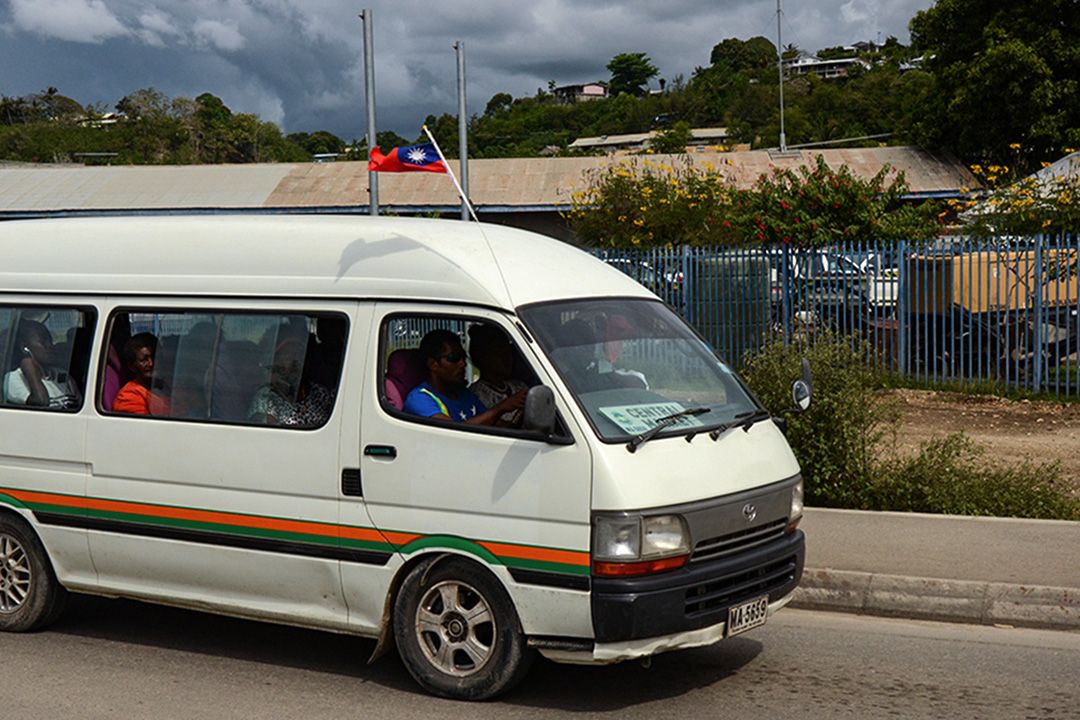
記者/譯者
Why is Chinatown in the Solomon Islands targeted by riots?

There is a recent international news, although not very eye-catching, but it has a deep entanglement with Taiwan: a recent riot broke out in the Solomon Islands, which severed diplomatic relations with Taiwan in 2019, and the target of the attack was the "Chinatown" in the capital of Solomon Islands.
In fact, this is not the first time that Somalia's Chinatown has been attacked by locals - as early as the end of the 2006 Somalia parliamentary election, the new prime minister was accused by his political opponents of accepting Chinese funds, which made Chinatown become the target of voters' anger and attack.
The pictures of houses being burned, smashed and looted in Suoguo Chinatown these days are simply a replica of the 2006 riot.
But having said that, Solomon's Chinatown did not appear after the rise of China in recent years: as early as more than 100 years ago, there were already many immigrants from Guangdong, who followed the British colonists to invest in Solomon's tropical cultivation industry, in The capital of Solomon Islands is populated by a love song called "Walkabout Long Chinatown", which is based on the theme of Solomon Islands Chinatown in the 1960s. Because of its popularity, it is still known as the "Underground National Anthem of the Solomon Islands".
I discussed it with a friend this morning, and I feel that overall, the background driving force of the recent developments in the Solomon Islands has not changed much from when I went to Solomon for an interview in 2019, and the current Prime Minister still decided to establish diplomatic relations with Beijing that year. Sogavare.
Unsurprisingly, Sogavare and other pro-Beijing Sogavare politicians have also begun to suggest that "this riot against the Chinese is the result of some Western forces getting too close to Beijing in retaliation for Solomon's severing of diplomatic ties with Taiwan. And the planned conspiracy”; foreign media also generally analyze this riot in the framework of international geopolitical wrestling.
But my friends and I both believe that the real deep-seated reason for this incident is the local politics and historical legacy within Somalia, as well as local residents' dissatisfaction with resource allocation.
Why do you say this way?

As the name suggests, the Solomon Islands is a country composed of many islands, and the two most important islands are the most populous "Malayta Island" and the "Guadalcanal Island" where the capital is located.
Generally speaking, people on the Falklands consider themselves more "hard-working and shrewd" than people on other islands and have the largest population. It's just that the central government and capital of Somalia have never been located on the Falklands, so the people on the Falklands have to leave their hometowns. , travel to the capital and other islands to make a living.
Over time, many Falklanders have accumulated a lot of grievances against the central government-led allocation of financial resources - and it is said that the "mobs" who attacked Chinatown and created riots this time are mainly these Malays.
When Solomon broke off diplomatic relations with Taiwan in 2019, Malaya was also the local government most opposed to the establishment of diplomatic relations with Beijing, and even threatened to break away from the Solomon central government and establish an independent country if it did not resume diplomatic relations with Taiwan. In addition, Malaysia has continued to interact closely with the Taiwanese government. When the pneumonia outbreak broke out last year, the Taiwanese government also donated anti-epidemic materials, which were designated to be sent to Malaya.
The "Yu Liang complex" of the "Falklands and Guadal Islands" mentioned above is an axis that the general media tends to ignore when analyzing the political situation in the Solomon Islands - but another factor that is more often ignored is actually the local "Chinese". community".

The Chinese living in the Solomon Islands today are a very diverse group:
In addition to the Cantonese "old overseas Chinese" who immigrated to the past more than a hundred years ago, since the 1980s, there have also been many Chinese wood merchants in Malaysia (mainly from Sabah and Sarawak in East Malaysia) who began to go to the Solomon Islands to cut down Rainforest, and these Chinese wood merchants are the economic lifeline of Solomon Islands today - not only do they control the entire Solomon Islands export trade (timber is the most important export commodity of Solomon Islands, accounting for more than 60% of exports, and almost all of them are sold to China), The real estate projects in the capital are also in the hands of these Malaysian Chinese wood merchants.
In addition, after China's reform and opening up, many old overseas Chinese from Guangdong also brought in many immigrants from Guangdong. Together with the influx of Fujian immigrants (mainly from Fuqing) around 2000, these "new Chinese" control The retail industry in Somalia—grocery stores and snack bars (Kai Bar) on the roads of the capital is almost all run by these "new Chinese".
In other words, it is not surprising that the Chinese are the targets of attack, because whether it is the Chinese wood merchants in Malaysia or the new Chinese immigrants who have poured in in recent years, these Chinese control the economy of Somalia, and they are not interested in the economy of the country. The Malayttas (and other Solomons) who are dissatisfied with the allocation of resources can easily think that these Chinese are "plundering the country's resources" (and thus often interpreted as "targeting Beijing").
Taken as a whole, Solomon Islands society presents a paradoxical phenomenon: politicians turn to China in order to get rid of "Western power" and increase diplomatic leverage, but the people are witnessing the Chinese control of land and economy every day , feel the huge gap between the rich and the poor in daily life.
Regarding the dynamics of these levels, Duan Media once went to the Solomon Islands and made four on-site reports, and now it is still analytical in retrospect. You are welcome to refer to and give advice:
"Pacific Island Countries in the Epidemic: Big Powers' Wrestling Break and Public Health Risks"
*As to how Taiwan continues to "exchange money" with Malaita Province after breaking diplomatic relations, you can refer to this government press release: " Taiwan still donating epidemic prevention materials to Solomon Malaita Province after breaking diplomatic relations"
**As to how much Solomon's economy relies on timber exports and the Chinese market, you can refer to the latest trade data from Solomon .
Like my work?
Don't forget to support or like, so I know you are with me..
Comment…